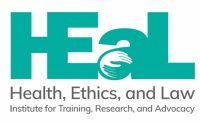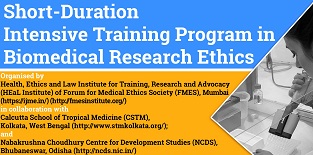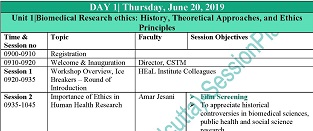Short-Duration Intensive Training Program in Biomedical Research Ethics
Organisers:
- Health, Ethics and Law (HEaL) Institute for Training, Research and Advocacy of Forum for Medical Ethics Society (FMES), Mumbai in collaboration with
- Calcutta School of Tropical Medicine, Kolkata (CSTM), Kolkata; and
- Nabakrushna Choudhury Centre for Development Studies (NCDS), Bhubaneshwar, Odisha
Day & Dates: Thursday, June 20 to Saturday, June 22, 2019
Venue: Calcutta School of Tropical Medicine, Kolkata
Course Directors:
- Dr Sunita Bandewar, Director, FMES’ Health, Ethics and Law Institute of Training, Research and Advocacy, Mumbai-Pune; Working Editor, IJME; Gen Sec, FMES
- Prof Dr Santanu Tripathi, Professor and Head, Department Clinical and Experimental Pharmacology, Calcutta School of Tropical Medicine, Kolkata. India
- Prof Dr Srijit Mishra, Director, Nabakrushna Choudhury Centre for Development Studies, Bhubaneswar, an Affiliate Institute of Indian Council for Social Science Research., Bhubaneswar, Odisha
Faculty:
- Dr. Amar Jesani, Editor, Indian Journal of Medical Ethics (IJME); Visting Faculty: Centre for Ethics, Yenepoya University, Managalore, and Centre
- Anant Bhan, Independent Sr Research Professional in Global Health and Bioethics; Visiting Professor, Centre for Ethics,
Yenepoya University, Mangaluru. KA. - Prof Dr Santanu Tripathi, Professor and Head, Department Clinical and Experimental Pharmacology, Calcutta School of Tropical Medicine, Kolkata. India
- Subrata Chattopadhyay, Founder-Head and Professor of Physiology at the College of Medicine and Jawaharlal Nehru Memorial Hospital, the West Bengal University of Health Sciences, India.
- Sunita Bandewar, Director, FMES’ Health, Ethics and Law Institute of Training, Research and Advocacy, Mumbai-Pune; Working Editor, IJME; Gen Sec, FMES
About the course: The course curriculum has a legacy of 15 years to which a number of scholars including those trained in bioethics have contributed. Over time they developed research ethics case studies from the Indian context. These serve as one of the key resources for the course.
The course aims to equip course participants with knowledge and skills in research ethics. They would serve as significant human resource to take the learnings to their own ecosystems and facilitate knowledge transfer in research ethics in their organization and peer networks.
Goal: To enable course participants to identify ethical issues in biomedical research and apply ethical reasoning to resolve them towards safeguarding research participants’ respect, dignity and rights; upholding research integrity.
Specific objectives:
- To learn about history and origins of research ethics discourse and principles in biomedical research, and their relevance to contemporary biomedical research enterprise.,
- To strengthen the awareness of participants of ethical issues in biomedical research involving human participants.,
- To strengthen the understanding of select key concepts in biomedical research ethics, such as, informed consent, privacy, confidentiality, standard of care, ancillary care, compensation, risk & benefits, data sharing, conflict of interest, and publication ethics.
- To learn the application of ethical reasoning to respond to ethical issues in biomedical research; and enhancing skills in operationalizing research ethics principles in practice.



